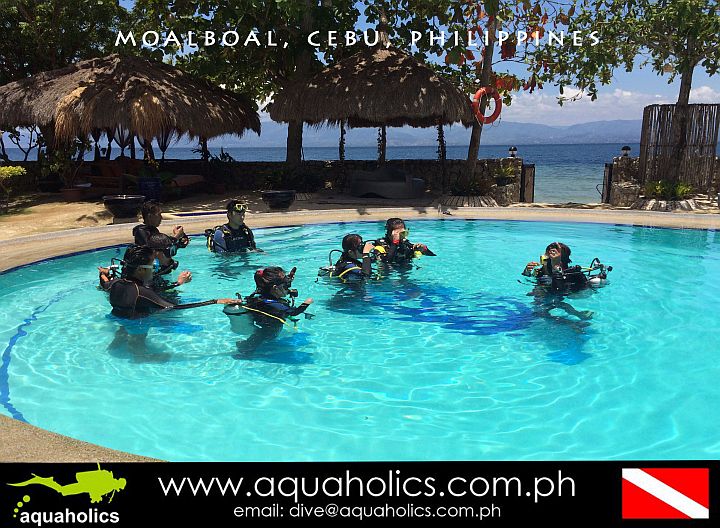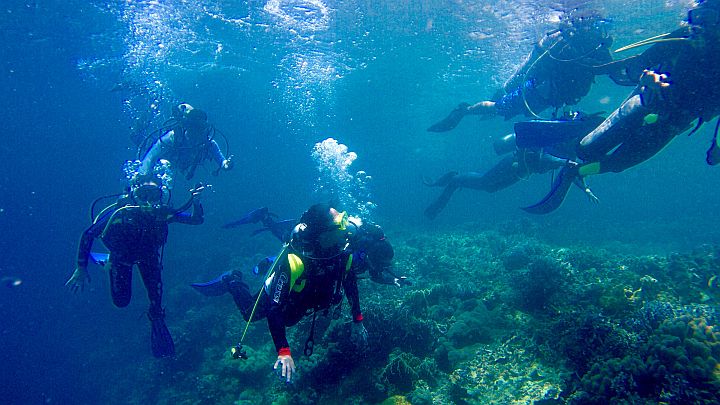SUMMER is the perfect time to get ourselves out there. The most common, if not overused, place we find ourselves in is the beach because swimming or simply basking under the sun will never be overrated. For an extensive underwater
adventure, scuba diving is highly recommended. Unlike other diving types where you hold your breath or pump air from the surface, in scuba diving, you breathe through the mouth using the regulator attached to the cylinder which stores the oxygen needed. There’s less restriction and more interaction underwater.
And I took my first breath underwater.

A good diver is a calm diver, hence, long and continuous deep breaths must be exercised. After listening to the tutorials, briefing, heart-meant assurances,
I was still anxious to entrust my dear life to the underwater apparatus precariously mounted on my back. We have the fins, the mask, the buoyancy control device or BDC to help us float at the surface, and the weights to help us go underwater. The last two were the most difficult to practice in the pool. It took a while to get the hang of it, and even harder when I tried to recall the three ways to neutralize the pressure in the ears and sinuses which, if done incorrectly, could lead to serious injury or death. The deeper you go, the more pressure water exerts on you. The more pressure, the lesser air space there is in the ears, sinuses, lungs, and mask.
The smiling faces in the brochure and the casual reactions of the rookie scuba divers in the video tutorial did not have the faintest resemblance to what I was feeling inside. There were just too many things to do all at once. As we were encouraged to marvel at the underwater scenery, we were also strongly advised to be mindful that we may not damage the marine life. True enough, the water world is undoubtedly breathtaking—figuratively.
PADI Divemaster Dino Bustamante stressed the importance of avoiding any contact with marine life. We are there only to observe and enjoy. The best way to get a closer look of the animals is by calm and slow approach. Most of them don’t sting or bite. Whether a seasoned diver or it’s our first breath
underwater, we share the same responsibility in protecting the diverse marine life. Reckless diving could lead to bumping into corals and destroying decades
of growth. After experiencing the ABCs
of diving, Dino shared the ways a diver can protect and preserve the underwater
environment. As a professional diver for almost 30 years, Dino himself is against the feeding whale of sharks in Oslob which now has gained attraction and money from the tourists and the locals. This brings us to his first advice:
Be aware that your interactions could affect the aquatic life.
Never feed the animals as this may
affect their growth and reproduction. It would also change their natural behavior if they become accustomed to feeding. All this could cause an ecological imbalance to the aquatic life. Do not ride or play with them as this may stress the animals or interrupt their mating behavior.
Take caution when taking photos.
Most animals are sensitive to camera flashes. The light does not harm them but the sudden flash of light does. Also, make sure that they are not harmed by the bump of the camera.

Be mindful of your body and equipment placement.
Keep the gauges and alternate air source secured so they don’t drag over the reef or other fragile organisms. Make sure you don’t swipe them with your fins too. Control your buoyancy so you don’t accidentally crash on to the corals.
Report environmental destructions.
As a diver, we are privileged to have explored the gifts of the underwater world, but this also puts us in a unique position to monitor the health of the waters. If you notice injury to the animals, strange substance in the water, or anything odd whatsoever, report immediately to the responsible authorities in the area.
Be role model to other divers and non-divers.
Showing respect to aquatic life sets a good example to swimmers and beach bums alike. Divers can see
underwater the results of carelessness and neglect. Share and teach so others will be made aware.\
Make informed decisions
when selecting a diving spot.
Choose resorts or establishments that are dedicated to sustainable business practices. Obey local laws and regulations. Do not collect souvenirs from underwater like corals or shells.
Understanding marine life through continuing
studies and certification could go a long way.
Mastering control of your buoyancy, learning about the fragile organisms and proper interactions with them, knowing the rules and your limits can prevent damage to aquatic life every time we dive. Sustainability gives a chance for other divers to also have this magnificent experience of being one with nature.
* Club Serena offers PADI Scuba Courses and Fun Dives, Freediving or Breathold Courses. For scuba diving and activities contact +63939 910 5530 (10 a.m. to
7 p.m.) or email [email protected].
Address: White Beach, Moalboal 6032, Philippines



